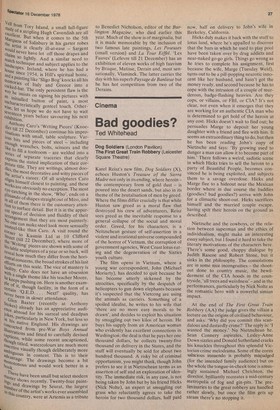Cinema
Bad goodies?
Ted Whitehead
Dog Soldiers (London Pavilion) The First Great Train Robbery (Leicester Square Theatre) Karel Reisz's new film, Dog Soldiers (X), echoes Huston's Treasure of the Sierra Madre not only in its ending, where heroin — the contemporary form of gold dust — is poured into the desert sands, but also in its theme of the brutalisation of men by greed. Where the films differ crucially is that while Huston saw greed as a moral flaw that destroyed his crew of adventurers, Reisz sees greed as the inevitable response to a general collapse of the social and moral order. Greed, for his characters, is a Neitzschean gesture of self-assertion in a violent and irrational universe compounded of the horror of Vietnam, the corruption of government agencies, West Coast lotus eating and the degeneration of the Sixties youth culture. The film opens in Vietnam, where a young war correspondent, John (Michael Moriarty), has decided to quit because he has become utterly sickened by the atrocities, specifically by the despatch of helicopters to gun down elephants because it's suspected that the Vietcong are using the animals as carriers. Something of a spoiled idealist, he writes to his wife that 'there are no more easy morals to be drawn', and decides to exploit his situation by smuggling out two kilos of heroin. He buys his supply from an American woman who evidently has excellent connections in Washington; the deal is that he pays her one thousand dollars, he collects twenty-five thousand on delivery in the States, and the stuff will eventually be sold for about two hundred thousand. A risky bit of criminal opportunism, you might think, though John prefers to see it in Nietzschean terms as an assertion of self and an exploration of identity. The immediate risk, in any case, is not being taken by John but by his friend Hicks (Nick Nolte), an expert at smuggling out grass who reluctantly agrees to take the heroin for two thousand dollars, half paid now, half on delivery to John's wife in Berkeley, California.
Hicks duly makes it back with the stuff to lotus land, where he's appalled to discover that the bars in which he used to play pool have been taken over by drug addicts and near-naked go-go girls. Things go wrong as he tries to complete his assignment, first because the wife, Marge (Tuesday Weld), turns out to be a pill-popping neurotic innocent like her husband, and hasn't got the money ready, and second because he has to cope with the intrusion of a couple of murderous, badge-flashing heavies. Are they cops, or villains, or FBI, or CIA? It's not clear, not even when it emerges that they are working for an authentic CIA man who is determined to get hold of the heroin at any cost. Hicks doesn't wait to find out; he persuades Marge to deposit her young daughter with a friend and flee with him. It seems an extraordinary thing to do, but then he has been reading John's copy of Nietzsche and gays: `By growing used to danger a man can allow it to become part of him.' There follows a weird, sadistic scene in which Hicks tries to sell the heroin to a party of Beautiful People, becomes convinced he is being exploited, and subjects them to a savage overdose. Hicks and Marge flee to a hideout near the Mexican border where in due course the baddies (goodies? bad goodies?) arrive with John for a climactic shoot-out. Hicks sacrifices himself and the married couple escape, having spilt their heroin on the ground as described.
Nietzsche and the cowboys, or the relation between superman and the ethics of individualism, might make an interesting essay subject, but I found it hard to take the literary motivations of the characters here. There's some good, choppy dialogue by Judith Rascoe and Robert Stone, but it sinks in the philosophy. The consolations are in some nice incongruities — the shootout done to country music, the bewilderment of the CIA hoods in the countryside, 'all trees and weirdness' and in the performances, particularly by Nick Nolte as the romantic hero with a powerful simian impact.
At the end of The First Great Train Robbery (AA) the judge gives the villain a lecture on the origins of civilised behaviour, and asks: `Why did you commit this scandalous and dastardly crime?' The reply is: 'I wanted the money.' No Nietzschean he. Sean Connery aspirates, Lesley-Anne Down sizzles and Donald Sutherland cracks his knuckles throughout this splendid Victorian crime melodrama. Some of the corny salacious innuendo is probably misjudged (for the intended family audience) but on the whole the tongue-in-cheek tone is amusingly sustained. Michael Chrichton, the director, brilliantly recreates a mid-century metropolis of fog and gin-pits. The preliminaries to the great robbery are handled rather slowly, but once the film gets up steam there's no stopping it.


































 Previous page
Previous page